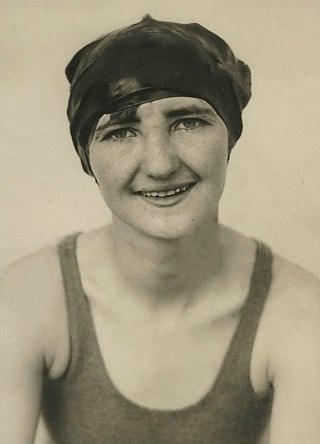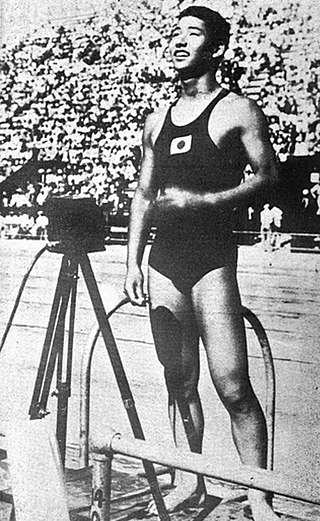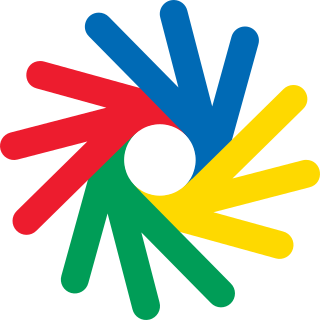
The 1924 Summer Olympics, officially the Games of the VIII Olympiad and officially branded as Paris 1924, were an international multi-sport event held in Paris, France. The opening ceremony was held on 5 July, but some competitions had already started on 4 May. The Games were the second to be hosted by Paris, making it the first city to host the Olympics twice.

At the 1900 Summer Olympics in Paris, seven swimming events were contested. Only men competed in the swimming competition. There was a total of 76 participants from 12 countries competing. As with the rowing events, swimming took place on the Seine between the Courbevoie Bridge and the Asnières Bridge.

The 1988 Summer Olympics took place in Seoul, South Korea. The swimming competition, held from September 18 to September 25, was notable for the seven medals, including five golds, won by Matt Biondi, the six golds won by Kristin Otto, and the three individual golds won by Janet Evans. 633 participants from 77 countries were competing.

The 1924 Summer Olympics, officially known as the Games of the VIII Olympiad, was an international multi-sport event held in Paris, France, from 4 May to 27 July. A total of 3,089 athletes from 44 nations participated in 126 events in 17 sports across 23 different disciplines.
At the 1912 Summer Olympics, nine swimming events were contested. Swimming events were held in a 100 m course built in Stockholm harbor. For the first time, women's events were part of the Olympic swimming program. The competitions were held from Saturday July 6, 1912, to Friday July 12, 1912. There was a total of 120 participants from 17 countries competing.
At the 1920 Summer Olympics in Antwerp, ten swimming events were contested. The women's 300 metre freestyle event was new since the previous Games in 1912. The competitions were held from Sunday August 22, 1920, to Sunday August 29, 1920. There was a total of 116 participants from 19 countries competing.

The Philippines, also known as the Philippine Islands, competed at the 1928 Summer Olympics in Amsterdam, Netherlands, which was held from May 17 to August 12. The country's participation in Amsterdam marked their second appearance at the Summer Olympics since their debut at the previous Games in 1924, which were held in Paris, France.

Haiti competed at the 1924 Summer Olympics in Paris, France. These Games were held from 4 May to 27 July 1924. The country's participation in Paris marked its second appearance at the Summer Olympics since its debut in 1900.

The United States of America has sent athletes to every celebration of the modern Summer Olympic Games with the exception of the 1980 Summer Olympics, during which it led a boycott in protest of the Soviet invasion of Afghanistan. The United States Olympic & Paralympic Committee (USOPC) is the National Olympic Committee for the United States.

Italy has sent athletes to most of the modern Olympic Games held since 1896, outside of not having officially participated in the 1904 Summer Olympics.

The modern Olympic Games were founded by French historian Pierre de Coubertin. France has competed in every edition, with the possible exception of the 1904 Games.

Water polo has been part of the Summer Olympics program since the second games, in 1900. A women's water polo tournament was introduced for the 2000 Summer Olympics. Hungary has been the most successful country in men's tournament, while the United States is the only team to win multiple times at the women's tournament since its introduction. Italy was the first to win both the men's and women's water polo tournaments.

The swimming competitions at the 1968 Summer Olympics in Mexico City took place from 17 to 26 October at the Alberca Olímpica Francisco Márquez. Swimming featured a record total of 29 events. There was a total of 468 participants from 51 countries competing. The United States dominated the competition, winning 52 of 87 possible medals. 15-year-old American phenom Debbie Meyer from Maryland won three gold medals.

At the 1924 Summer Olympics in Paris, five diving events were contested. The competitions were held from Monday, 14 July 1924 to Sunday, 20 July 1924.

Ethel Minnie Lackie, also known by her married name Ethel Watkins, was an American competition swimmer, Olympic champion, and world record-holder.

The men's high jump event was part of the track and field athletics programme at the 1924 Summer Olympics. The competition was held from Sunday, July 6, 1924, and Monday, July 7, 1924. Twenty-seven high jumpers from 17 nations competed. The maximum number of athletes per nation was 4. The event was won by Harold Osborn of the United States, the nation's seventh consecutive victory in the men's high jump. As in 1920, the Americans went 1–2 in the event, with Leroy Brown earning silver. France took its first high jump medal since 1908 with Pierre Lewden's bronze.
The men's 100 metre freestyle was a swimming event held as part of the swimming at the 1924 Summer Olympics programme. It was the sixth appearance of the event, which had not been featured at the 1900 Games. The competition was held on Saturday July 19, 1924 and on Sunday July 20, 1924. There were 30 competitors from 15 nations. Nations were limited to three swimmers each, down from four in 1920. The United States swept the medals for the second consecutive Games, winning its fourth consecutive gold medal. Johnny Weissmuller beat two-time defending champion Duke Kahanamoku in the final. Kahanamoku was the first man to win three medals in the event. His brother Samuel Kahanamoku earned the bronze medal.

The men's 100 metre freestyle was a swimming event held as part of the swimming at the 1932 Summer Olympics programme. It was the eighth appearance of the event, which had not been featured only at the 1900 Games. The competition was held from Saturday August 6, 1932 to Sunday August 7, 1932. Twenty-two swimmers from ten nations competed. Nations had been limited to three swimmers each since the 1924 Games. The event was won by Yasuji Miyazaki of Japan, snapping a five-Games American win streak. Japan was only the third nation to win a gold medal in the event. The final was entirely made up of Japanese and American swimmers, three each; Japan took the top two places as Tatsugo Kawaishi earned silver. The top American, Albert Schwartz, earned bronze. While the American win streak had ended at five, the nation's podium streak ran to seven Games.

The men's 100 metre freestyle was a swimming event held as part of the swimming at the 1936 Summer Olympics programme. It was the ninth appearance of the event, which had not been featured only at the 1900 Games. The competition was held on Saturday and Sunday, 8 and 9 August 1936. Forty-five swimmers from 23 nations competed. Nations had been limited to three swimmers each since the 1924 Games. The event was won by Ferenc Csik of Hungary, the nation's first victory in the event since 1904 and third overall. For the second consecutive Games, Japan took two medals in the 100 metre freestyle, this time silver and bronze. The United States' seven-Games medal streak in the event ended as the nation's best result was sixth place by Peter Fick.

The First International Silent Games, or First International Games for the Deaf, now referred to retroactively as the 1924 Summer Deaflympics, were the inaugural edition of the Deaflympics. The Games were held in Paris, France, from 10 to 17 August 1924, as an equivalent to the Olympic Games for deaf athletes. They were organised on the initiative of deaf Frenchman Eugène Rubens-Alcais, who, just after the Games, co-founded the Comité International des Sports des Sourds with other "deaf sporting leaders". The 1924 Games were "the first games ever" for athletes with a disability, preceding the World Wheelchair and Amputee Games in 1948, which became the Paralympic Games in 1960 but which did not include events for deaf athletes.

















